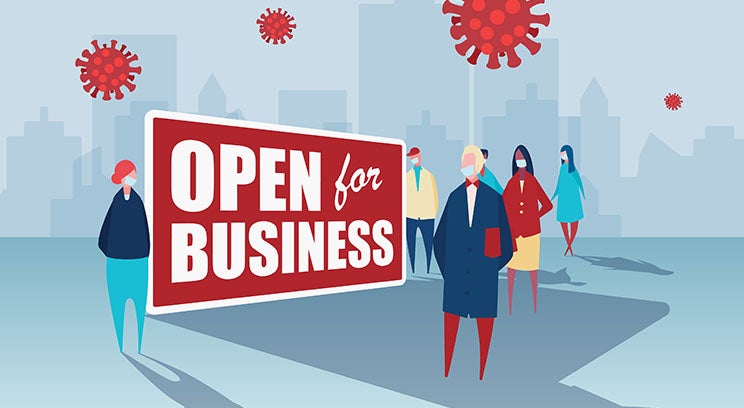
We are now in the second most dangerous phase of the COVID-19 pandemic. The first phase was when we were unaware of how deadly and contagious the virus is and had not yet begun taking careful steps to prevent spreading it. The second is the reopening of businesses, but we are not sure how quickly or safely we can or even should be doing that. In fact, there is now hesitation since new coronavirus hotspots have emerged as several US states have already begun reopening.
Opening up again is critical — when done safely. Our economies were never built for this. The pandemic kills people to be sure, but so do hunger and the crushing weight of collapsing finances. There is a balance to be found between opening up and avoiding the spread of the virus.
But we must tread cautiously, as we don’t yet have the comprehensive testing facilities available that would identify all potential carriers and allow us to isolate them until the virus peters out. And because we don’t have that information, we also don’t have the data that would allow us to make completely informed decisions, both for our companies and ourselves. We simply must do the best we can.
As the world begins to open up, businesses will fall into one of following three main categories for working from home.
Working from home options
1. Not feasibly possible
There will be companies for which working at home for most of their employees was never really an option and still isn’t. Many of the companies that fall in that category have been working all along (e.g., grocery stores, pharmacies, hospitals, etc.), so the rest of us may live safely in isolation. These essential workers have our immense gratitude and respect. Other companies were forced to shut down but are now beginning to gingerly open up again, like amusement parks, movie and television studios, movie theaters, and hotels.
2. Very feasible
Then there are other businesses for which work from home functions better and more easily than we ever would have realized if it weren’t for the pandemic. Software companies, law firms, consulting firms, advertising and marketing agencies, and accounting firms may fall into that category.
Many of these will now be considering whether the benefits of working in the office are outweighed by the costs, not just in terms of the pandemic but also after the pandemic is over, in terms of real estate costs, commuting, and talent access. Some have already announced long term plans to begin a transition to working from home.
3. In between
The third group are the ones for which working at home may be possible for some or even many of their employees but will have substantial downsides in the long run in terms of productivity and company culture. Chemical suppliers, hardware manufacturers and others may fall into this group.
And of course, individual departments within a company may wind up making different decisions than their companies as a whole. We, of course, will focus here primarily on our law departments, but as the lawyers for your company you should recognize that other departments may face the same decisions as you do, and may need your counsel to make the right ones.
Should law departments return to the office?
I will assume for the sake of argument that you and your law department colleagues have managed to work from home rather effectively during most of the stay at home orders. After all, the tools you need to do your work should be readily available no matter where you are, unlike production chemists or medical researchers, for example. But businesses are now reopening, and many of you are beginning to hear rumblings that you may soon be able to return to the office.
Some of you may be told that you should not yet return, in which case you have no decision to make right now. But others may be told that you either must or may return if you feel comfortable. In both cases you will have to weigh the risks of returning to the office against the costs of choosing not to do so.
It may seem like a difficult decision, in part because the disease is terrifying and has been made more so by the news and government experts in an effort to reinforce social distancing.* But we have the tools and the logic we need to make very personal but rational decisions, and we as lawyers are experts in risk management.
Here is what we know right now. As mentioned, the United States doesn’t yet have the testing facilities that would allow us to very quickly identify all human vectors and isolate them and treat them so we could simply eliminate the disease, and I personally don’t see us developing those facilities for at least six to twelve months.
We also are not likely to get vaccines until early 2021, and we will not be sure how effective those vaccines are until they are tested on a large scale. Since we cannot wait until testing and vaccines do become available, we need to make a decision as though neither of them is a consideration.
At-risk mitigation
We know that the risk is not the same for all people. First, some locations and businesses have a much higher risk profile than others. If you are the lawyer for a hospital in a coronavirus hotspot and your offices are in close proximity with the medical facilities, you and your legal (and business) colleagues may find it more prudent to work from home or another location.
Second, the disease is far deadlier for older people, and unless you are young, that may seem like a huge consideration. But let’s put some perspective on that. I will quote at some length from the June 12 Wall Street Journal’s Opinion, Review and Outlook column “The Covid Age Penalty”:
About 80% of Americans who have died of Covid-19 are older than 65, and the median age is 80. A review by Stanford medical professor John Ioannidis last month found that individuals under age 65 accounted for 4.8% to 9.3% of all Covid-19 deaths in 10 European countries and 7.8% to 23.9% in 12 U.S. locations. …
The risk climbs especially for those over age 80. According to the Foundation for Research on Equal Opportunity, Americans over 85 are about 2.75 times more likely to die from Covid-19 than those 75 to 84, seven times more likely than those 65 to 74 and 16.8 times more than those 55 to 64.
Now, I am in good health, older than 65, but still some distance from 80. Does that mean I shouldn’t worry about catching COVID-19? Of course not. And if you are in your 30s, you should still worry. Not only are the symptoms awful in severe cases, but you can easily infect others before becoming symptomatic.
But from a risk analysis perspective, it helps to know what the numbers can tell us. What they tell me is that I should take reasonable precautions (e.g., washing my hands regularly and wearing a mask correctly) but not let fear turn me into a hermit. If either you or someone you live with is highly at-risk, the precautions you consider reasonable could and probably should be much different than mine. Below are reasonable precautions all in-house counsel and their staff should follow.
1. Wear a mask
One precaution I personally find reasonable is wearing a mask in any kind of crowded situation. There has been a large debate over how effective face masks are in preventing the spread of COVID-19, but no credible research I have been able to locate says that they don’t help at all. Indeed, a recent study in Germany found that face masks
“reduced the cumulative number of registered COVID-19 cases between 2.3% and 13% over a period of 10 days after they became compulsory. Assessing the credibility of the various estimates, we conclude that face masks reduce the daily growth rate of reported infections by around 40%.”
Of course, we know that unless you have an N95 mask or better, wearing a mask yourself is more likely to protect those around you than they are to protect you from them (although they will still provide some protection for you as well), but if everyone wears a mask, we will all be protecting each other.
I grant that they can feel awkward. I had never worn a mask outside of costume parties before the epidemic, and they certainly felt strange at first. But I am becoming more accustomed to them and now I am reminded of a quote from The Princess Bride:
Fezzik: Why do you wear a mask? Were you burned by acid or something like that?
Man in Black: Oh no, it’s just that they’re terribly comfortable. I think everyone will be wearing them in the future.
Also, we are in the early days of mask culture, at least in the Americas, Europe, and Africa. It’s common to see most people wearing them in public in several Asian countries (e.g., Japan, China, and South Korea), as they previously endured the 2002 SARS epidemic in and the 2015 MERS outbreak.
I imagine that someone will soon design an effective mask that is not only broadly available but transparent and comfortable, making them more palatable. In the meantime, we should all wear a mask in crowded places simply because the societal benefit far outweighs the temporary and slight inconvenience.
2. Commute safely
Another precaution concerns your commute. If you can avoid congested public transportation, for example, by taking an alternate route or driving, by all means, do so. If you can’t, you may want to see if you can work from home for another several months, especially if you or your housemates are in a higher risk category. You should also avoid crowded lobbies, elevators, and cafeterias, especially if you see that people are not doing a good job maintaining a distance and wearing masks.
3. Clean your office (thoroughly)
What about the sanctity of your office? Should you just come in and Lysol all surfaces? If so, will you be safe from exposure? Maybe. You may want to check with your facilities management group on two issues:
- What precautions are they taking to ensure the cleaning staff is healthy and using the right disinfectants?
- What precautions they are taking with regard to your HVAC systems?
I think the latter is particularly important because the right kind of HVAC system will likely reduce the risk of transmission while the wrong one will likely increase it. Note that this is a critical issue to raise not only from a personal perspective but also from a corporate liability perspective.
4. Reassess your office culture
Finally, you should consider the culture within your law department. Do you have too many nonessential meetings? Do colleagues tend to drop by unannounced, then linger longer than they might need to? Are there any cultural or process changes you think should be made on at least a temporary basis that might reduce the risk of disease transmission?
After you have considered these and any other risks that concern you, make a rational decision on how and whether you will be willing to return to work. I think all law departments I have encountered would be interested in addressing such concerns, either by making changes or by allowing you to continue to work from home.
Be careful out there — and remember to wash your hands!
For more advice and resources on the coronavirus pandemic, visit the ACC Coronavirus Resource Center.
Author's note
* N.b., I am not one of those who believes there is a conspiracy to promote the “COVID-19 pandemic scam” or even to make a mountain out of a molehill. I do believe that the virus should be and is terrifying from a societal perspective. Just as our economies were not built to withstand long term isolation, they also were not built to withstand a global pandemic that threatens to overwhelm all existing medical facilities and slaughter large numbers of people, no matter how small those numbers may be as a percentage of the overall population. And because social distancing was so foreign to our previous habits, the governments needed to alarm their citizens sufficiently that they would take it seriously. As to the news, both left- and right-wing leaning journalists have learned to do what they must to remain popular with their constituencies, and they also have a cognitive bias in favor of those constituencies. Furthermore, news organizations are fighting for their lives right now, and alarming news is exciting news and exciting news draws eyeballs.




